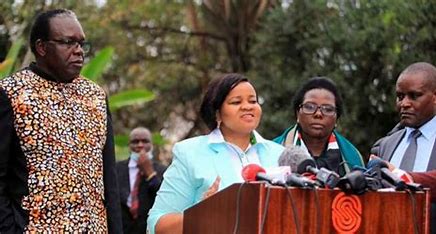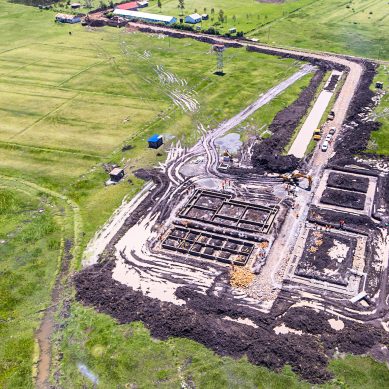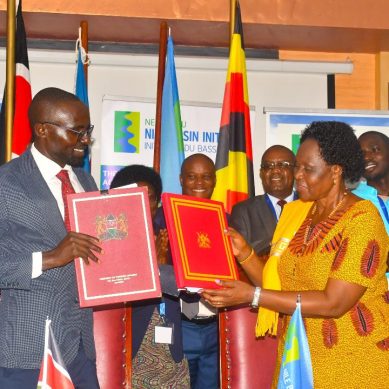
On August 11 as Independent Electoral and Boundaries Commission (IEBC) chairman Wafula Chebukati was getting ready to announce the presidential election, when he reportedly received communication from “above” to “hold on” until tallies from Tana River were received.
The outcome as of August 9 had not – apparently – gone to script and the outgoing President Uhuru Kenyatta, senior government officials say, was startled that what had seemed all along as a slam-dunk.
Tallying the result with the help of technology was suspended inexplicably as numbers streaming live on television defied predictions.
Hailed as the magical wand that would finally eliminate fraud in Kenya’s elections and deployed for use in 2013, 2017 and 2022 to raise the credibility and verifiability of results, technology has quickly turned into a black hole the governing elite and those bidding for a bite at the cherry struggled to manipulate in their favour to no avail.
The singing and dancing that had for three months been timbred with Azimio election anthem Leo ni Leo (It’s now or never) and the slogan Baba the Fifth (in reference to Raila) faded as the count relayed live on television suggested that the numbers had defied state and pollsters’ fore-conclusions as the Deputy President William Ruto raced to the finish line ahead of state-sponsored Raila Odinga.
Something had certainly startled the outgoing president and the Azimio alliance where they thought they were safest, senior government officials say. Consequently, a senior member of staff at Parliament says a plot was hatched very fast to buy time as options were explored to stall the process to either install Mr Odinga against the odds or force a rerun by running down the clock until the time provided by the constitution to announce the results expired.
Returning officers who were at Bomas of Kenya – the national presidential election tallying centre – tell of the anxiety that gripped IEBC officials when Chebukati told them he would delay the announcement pending verification of data from all the 46,232 polling stations in the country.
Unbeknown to them, the returning officer says, the commission had been infiltrated and strings were being pulled from elsewhere to influence the final outcome, hence the ‘Opaque’ rebellion minutes before results were announced.
There has been speculation that the rebel commissioners, dubbed Cherera Four: Juliana Cherera, Justus Nyang’aya, Francis Wanderi and Irene Masit, together senior staff at the elections body were induced disown the poll as “opaque” to force rerun.
Of the four, Cherera and Nyang’aya have opted to resign rather than defend their allegations at a tribunal been set up President William Ruto following the recommendation of the Justice and Legal Affairs Committee of Parliament. It is expected that the Wanderi and Masit will take the cue and throw in the towel to avoid unspecified embarrassing revelations that may suck in retired President Uhuru Kenyatta and senior state functionaries in his administration.
It is instructive to note that the official vehicles assigned to the commissioners and senior secretariat staff are fitted with car tracking and GPS systems, which store data that can be retrieved to shed light on their movements – especially who they met, venues, length of time, frequency and a lot more. It is alleged the likelihood of such scrutiny persuaded the dissenters to quit rather than face the prospect of being subject to criminal justice with irrefutable evidence.
The rabid scramble for the reins of power in Kenya is illustrated by the deep-seated factionalism in IEBC, which the Supreme Court has in the past three elections rebuked for flagrantly undermining the sovereignty of the electorate.
The latest episode in the fight for control and determination of the election results is highlighted by the rebellion in the commission, which cascades down to the secretariat whenever a presidential election is on the cards. With factions within IEBC doing the bidding for – allegedly – rival political formations, the 2022 elections brought to the fore the proxy wars that are fought in the commission’s boardroom at the behest of the political and business interests at play, which account of evidence presented at the Supreme Court, have infiltrated the secretariat and the commission.
The faction led by Juliana Cherera that alleged manipulation of the August 9 presidential election results in favour of William Ruto and the Kenya Kwanza Alliance provided a peek into the inhouse wars at the elections body. Even more intriguing was how and when IEBC vice chairperson Cherera, commissioners Justus Nyangaya, Francis Wanderi and Irine Masit distanced themselves from the conduct of the 2022 presidential election processing at the eleventh.
Recounting how things flipped against expectations, a senior civil servant in the office of the president described to Tell the mood of high expectations in former President Uhuru Kenyatta and Azimio la Umoja alliance presidential candidate Raila Odinga’s columns before the bubble burst on the night of August 10.
“The buoyancy faded when it emerged that the Kenya Kwanza presidential candidate William Ruto had established an unassailable lead. When he was told that IEBC was ready to announce the presidential election results and Ruto was on course to victory, the president hit the roof. He ordered the announcement to be put on hold until every vote had been processed,” says the civil servant, who was part of the team that was deployed by the state to monitor IEBC.
The official had also attended the initial Assumption of Power Committee meetings Kenyatta chaired at the Office of the President in anticipation of Raila victory.
In the meantime, the four renegade commissioners – Cherera, Nyangaya, Wanderi and Massit – were reportedly holding secret meetings at a posh apartment at Garden City Mall, Thika Road, to disown the final result. Even more intriguing was the involvement of IEBC senior secretariat staff, who according to IEBC chair Wafula Chebukati, was the convenor and chair of the meetings that labelled election results announced on August 15 as “opaque.”
The senior secretariat staff’s conduct was called into question after demanding a brand new top-of-the-range car and a hefty payoff to play ball.
Allegations of usurpation of duties of other office holders are not new at IEBC. In the countdown to the 2017 elections, an elections officer was allegedly assigned human resource duties, with total disregard to job description. According to a former IEBC communications officer, the move was deliberate and designed to prepare ground to rid the commission of IT manager Chris Msando, who was murdered eight days to the August 8, 2017, elections.
The officer explains that infiltration of IEBC by the state and business community has instilled fear in the team, and Msando’s unremitting stance on free, fair and verifiable elections – allegedly – scared power wielders to the point they looked for a way of eliminating him to gain access to the IEBC protected data and servers.
The fear and factionalism that have hamstrung IEBC is described in pixel-like detail by former vice-chair of the commission, Dr Roseline Akombe, who points out that “the second issue that concerned me on technology was the security of the hardware, database and network levels to ensure high availability and integrity of the systems.”
Despite the assurance that the ICT infrastructure had inbuilt system to reject and neutralise any breaches or disasters on Election Day, Akombe says, “These assurances were not convincing especially given that the commission did not have back-up data centres and relied on one at Anniversary Towers that was on the verge of collapsing.”
The stoutness with which Msando protected the infrastructure, adds Akombe, created panic among commissioners and secretariat staff, which ushered in his gradual isolation with the transfer of staff he interacted with freely.
“Christopher Msando was an extremely intelligent, hardworking and eloquent professional. He was among the few staff that understood all the technology-based processes. He worked closely with the chairman and appeared with me on several television and outreach programmes. Sadly, his brutal murder achieved the fear and intimidation it was meant to convey,” she says in her end-of-duty report.
Elimination of election officials is not alien to the elections agency. In 2022 IEBC official Daniel Musyoka, was killed and his body dumped in Kajiado. Gichugu IEBC returning officer Geoffrey Gitobu died after mysteriously falling ill and collapsing while at the agency’s Nanyuki’s office.
There have even been allegations the scuffle that was witnessed at Bomas of Kenya on August 15, minutes before their chairman announced the final presidential election results, was a deliberate plot to create confusion in which senior election officials would be seriously injured or killed. Constitutionally, IEBC had less than seven hours to announce the voters’ verdict or defer the presidential election to next year.
Against this backdrop, Akombe says, “We need the commission to be courageous and speak out, that this election as planned cannot meet the basic expectations of a credible election. Not when the staff are getting last minute instructions on changes in technology and electronic transmission of results…Not when commissioners and staff are intimidated by political actors and protestors and fear for their lives. Not when senior secretariat staff and commissioners are serving partisan political interests.”
- A Tell report








